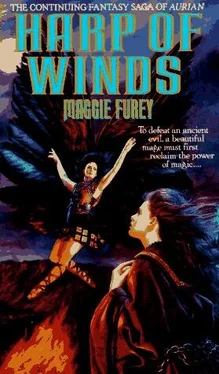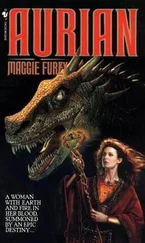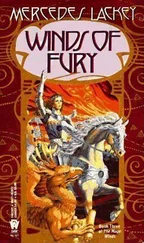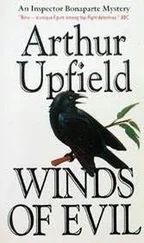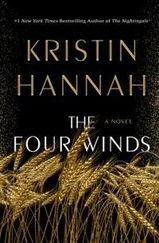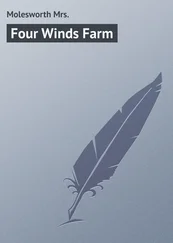Maggie Furey - Harp of Winds
Здесь есть возможность читать онлайн «Maggie Furey - Harp of Winds» весь текст электронной книги совершенно бесплатно (целиком полную версию без сокращений). В некоторых случаях можно слушать аудио, скачать через торрент в формате fb2 и присутствует краткое содержание. Жанр: Фэнтези, на английском языке. Описание произведения, (предисловие) а так же отзывы посетителей доступны на портале библиотеки ЛибКат.
- Название:Harp of Winds
- Автор:
- Жанр:
- Год:неизвестен
- ISBN:нет данных
- Рейтинг книги:4 / 5. Голосов: 1
-
Избранное:Добавить в избранное
- Отзывы:
-
Ваша оценка:
- 80
- 1
- 2
- 3
- 4
- 5
Harp of Winds: краткое содержание, описание и аннотация
Предлагаем к чтению аннотацию, описание, краткое содержание или предисловие (зависит от того, что написал сам автор книги «Harp of Winds»). Если вы не нашли необходимую информацию о книге — напишите в комментариях, мы постараемся отыскать её.
saga unfolds in a sweeping blaze of glory, terror, and mystic enchantment, as Lady Aurian and her lover Anvar return to the holy city of Nexis to find that the crazed Archmage Miathan’s sorcery has unleashed cataclysmic forces, locking the land in the icy grip of eternal winter.
Harp of Winds — читать онлайн бесплатно полную книгу (весь текст) целиком
Ниже представлен текст книги, разбитый по страницам. Система сохранения места последней прочитанной страницы, позволяет с удобством читать онлайн бесплатно книгу «Harp of Winds», без необходимости каждый раз заново искать на чём Вы остановились. Поставьте закладку, и сможете в любой момент перейти на страницу, на которой закончили чтение.
Интервал:
Закладка:
This might be a foe, but by the Reaper, he could cook! Yazour was ravenous. He gulped the broth quickly, burning his tongue. Loath though he was to ask favors of a Xandim, he held the cup out for more, but the stranger shook his head.
“Bastard!” the young warrior muttered. Turning away, he pulled the furs across his face and pretended to sleep again. In reality, he wanted time in which to think.
Why? Why had this Xandim gone out of his way to save an enemy? Yazour hated the stranger’s race with all his heart, yet the son of a pig had saved his life! The warrior turned restlessly, disturbed by the direction of his thoughts, and the wound in his thigh pulled painfully. The wound that had been dealt Yazour by his own people, his former companions and friends. Reaper’s curse, what a tangle! The warrior wondered if that was why the man had rescued him. The Khazalim were enemies of the Xandim, so Yazour was a victim of the stranger’s foes . . . But no, he thought. Even had he not recognized me at first, he must have known me for a Khazalim when he brought me here—yet still he cared for me! In the name of the Reaper, why? Yazour could stand it no longer. Rolling over, he pushed the furs aside to look his benefactor in the eye. “Why?” he demanded in Xandim, wishing he knew more of the language. He gestured at the fire, the cave, his bandaged wounds.
The man smiled, and held out his hand again. “Friend,” he repeated.
Yazour was in the stranger’s power, and besides, the man had saved his life. He forced a smile, and took the proffered hand. “Friend,” he agreed. For now, at any rate, you Xandim bastard, he thought.
Schiannath’s patient was soon asleep again, but he seemed much improved, and the outlaw decided that it was safe to rest after his hours of watching. He stood up carefully, there was only one place in the cave where he could do it without knocking his head on the roof—and stretched the kinks from his limbs. Then he stirred the fire, prepared some tea from leaves and berries gathered in kinder months, and ate a scanty meal from his hoarded supplies. Iscalda whickered from her place near the cave mouth, and Schiannath went to smooth her silken neck. “Well?” he asked her. “What think you of our new companion?”
The mare snorted in a manner so uncannily timely that the outlaw was forced to muffle his laughter so as not to waken his patient. “I couldn’t put it better myself,” he told her. “A friend, indeed—that Khazalim scum!” But the Goddess had commanded him to help this man, and so Schiannath would help him—for now, at any rate.
12
The Drunken Dog
The Drunken Dog, a typical dockside tavern if ever there was one, was the most squalid, insalubrious alehouse in Nexis, Its windows, broken time and again in countless brawls, had been nailed over with a clumsy patchwork of boards, and the taproom stank of smoke and grease and unwashed bodies. The floor was slick underfoot: a vile morass of sawdust, spilled drink—and, more often than not, blood. When the river was low, the air was thick with the noxious stench of dead fish and sewage. The tavern’s situation, down among the wharves and warehouses of the northern riverbank, would have been enough to make a strong man blanch, and a wise man turn hastily away; but even in this, the roughest of areas, the Dog had a bad name—and was proud of it.
Only the desperate dared pass into the shadowy, reeking interior of the Drunken Dog, where the City Guards would rarely venture. Only the lowest of the low—the gangs whose haunt was the darkened alleyway, whose trade was the quick knife-thrust in the back and the chink of gold in a stolen purse. Only the homeless, stinking, red-eyed wrecks whose love of ale had become an addiction. Only the sorry, worn-out whores, pox-ridden, scarred, and too long in the tooth to make an honest living from a better class of client. Only those who had already sunk so low that they had nothing left to lose—and Jarvas.
Jarvas sat in his corner near the ash-choked fireplace, his back to the wall and an unencumbered line between himself and the back door. It was the best spot in the room, within easy sight of the serving hatch to gesture for more of the raw, sour ale, and commanding a vantage over the entire taproom. It was his special place, and no one was prepared to dispute it,
Jarvas took a sip of the vile, cloudy brew from his grease-smeared tankard and grimaced at the taste. It was the sort of stuff, he mused, that was absolutely guaranteed to make a body ill—but that didn’t stop him, or everyone else in the place, from drinking it He was not usually the sort of man to waste his time wondering why he came here when he didn’t have to—he knew his own mind, and was not much given to soul-searching. These days, though, with life in the city gone from bad to worse, and, more significantly, the recent loss of his brother, he was finding himself in an increasingly gloomy and pensive mood. He came here for several reasons. First, because it was safe—-the mercenaries hired by the filthy Magefolk had only tried to come in once, and had regretted their rashness. He came because he could—he was a big man, and while he didn’t go looking for trouble, anyone unwise enough to cross him paid for it sooner or later. People around here tended to respect him, and it was known that Jarvas made a good friend and a merciless enemy. Finally—and it said a lot for him that he would admit such a thing to himself—Jarvas came here because he was lonely.
It made life hard when you were ugly, and big besides. Jarvas avoided mirrors. It seemed that when the Gods had made him, they had been in a hurry, and just picked up any features that lay to hand, with no thought for the result. His body was a gangling, uncoordinated, mismatched selection of parts. His hands and feet were too big for his frame—and that was saying a lot. His chest was too narrow for his broad shoulders and long legs, and as for his face... It was a nightmare. His nose was too long, and his ears stuck out. His pointed chin looked out of balance with his broad forehead and heavy brows. His eyes were a muddy gray-green and, despite his best efforts, his dark, stringy hair always looked unkempt. In short, he was a disaster. Men tended to look on him as a threat, and as for women—forget it! They wouldn’t look twice at him. Given his appearance, it was difficult for Jarvas to make friends—yet friends he had, and it was all due to the greatness of his heart.
Jarvas had his own place, down near the wharves. It consisted of two decrepit warehouses and a disused fueling mill, which adjoined one another on a piece of waste ground that had once held slums, burned down on the Archmage’s order as a potential plague spot in the Great Drought three years ago—just about the time that Jarvas had inherited the property, split between himself and his brother, Harkas.
He had been surprised by the bequest—his family had scraped a living as bargemen with an ancient, leaky craft. He had always discounted tales of a great-uncle, estranged by a family quarrel, who owned property on the riverside. Assuming that it was wishful thinking on the part of his parents, he had given the matter little thought. What sense did it make? No one wanted property along the north side of the river. In the past, perhaps, when the docks had been thriving and prosperous—before the weirs had been built and ships could come all the way upriver from Norberth—it might have been different, but now? Well, things had changed, that was all. Jarvas was already in his late twenties when his uncle had died. He had given up the barge trade by then, and had been earning his living in the city for the better part of a decade, turning his hand to any work that came along. While working as a warehouse foreman for the Head of the Merchants’ Guild, he had managed to scrape up a little education—Vannor believed in learning, and made sure it was available for those of his people who wanted it.
Читать дальшеИнтервал:
Закладка:
Похожие книги на «Harp of Winds»
Представляем Вашему вниманию похожие книги на «Harp of Winds» списком для выбора. Мы отобрали схожую по названию и смыслу литературу в надежде предоставить читателям больше вариантов отыскать новые, интересные, ещё непрочитанные произведения.
Обсуждение, отзывы о книге «Harp of Winds» и просто собственные мнения читателей. Оставьте ваши комментарии, напишите, что Вы думаете о произведении, его смысле или главных героях. Укажите что конкретно понравилось, а что нет, и почему Вы так считаете.
